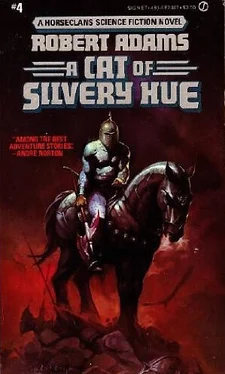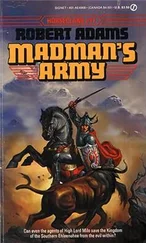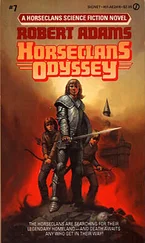And so, misinterpreting Danos’ pleas to retain his lower rank and station as modesty and the archer’s terror as embarrassment, the well-meaning Drehkos precipitated a situation whose culmination was to be horror and tragedy.
When informed of his “good fortune,” Danos could only stutter in his terror, “P-please … if-if-it p-please my l-lord, I—I am not, I am unworthy of … of such… .”
And, smiling as he had not in weeks, Drehkos slapped the quaking archer’s shoulder. “Ah, young, faithful Danos. Son, your modesty is most refreshing, but if any here is worthy of advancement, it is you. My dear boy, I have been selfish. I have kept you near to me because you remind me of happier days, of home, and you have served me well. You have proved many times over your loyalty, honesty and bravery. Now I am in great need of those very qualities, so I call again upon you, you see.”
“But-but, my lord, there be noblemen, and … and I … may I not remain a sergeant, an archer even, and … and stay by my lord?” Danes’ voice broke on the last words and his terror sent tears cascading over his cheeks.
Drehkos was touched, deeply moved by the display he misread, and his own voice was husky. “If I had harbored any doubts as to the wisdom of this decision, good Danos, you have now erased them. So get you back to the barrack and choose a reliable man for your sergeant. I’ll have my man secure you a good servant and quarters suitable to your new rank. You’ll command the existing guard, of course, and I’ll introduce you to Lord Myros at breakfast tomorrow.”
Danos would once more have spoken, would have pleaded, begged, even groveled, but Drehkos was now conversing with a member of his staff, and the adjutant, Tchahros, put a hand on Danos’ elbow, saying with a smile, “There’ll be plenty of time to thank our lord properly, lieutenant, but just now his mind is on more pressing matters.”
And the moment that all within Vawnpolis had awaited and feared at last arrived. Up the traderoad came marching in their thousands the hosts of the heathen, ahorse, afoot, on wagons. The morning sun winked on armor and weapon points in the seemingly endless river of men and animals. And to the watchers on the walls, the dustcloud which overlay the column seemed to stretch to the end of the world.
Lord Aldos turned to Drehkos, his grim face belying his light words. “Quite a lot of the bastards, aren’t there, my lord? Think you we’ve enough arrows and darts to properly serve them? I’d hate to think of a deserving pagan leaving this little party without a sharp souvenir.”
But Drehkos made no answer, and, seeing his searching glances at the arriving troops, all about him fell silent, lest their chatter distract the strategies they were sure he must be planning.
Drehkos was planning no strategy. He was straining his eyes at the foremost group of mounted nobles, seeking the familiar, stocky form of his brother, Hari.
It took the better part of a week to fully invest the city, throw up the earthworks just beyond bowshot of the outer defenses, set up the smaller, portable engines and start scouring the countryside for timbers suitable for assembling the larger ones. There was but little fighting. Nor was there any polite parlaying, though Drehkos had attempted such, sending a man he considered expendable, the abbot, Djohsehfos, whose monastery he had sacked.
The answer which the churchman had brought back had been only what Drehkos expected. The High Lord and his nobles would not treat with rebels. Only unconditional surrender of Vawnpolis and all within its walls would be accepted. Any future emissaries, unless they came to announce such surrender, would be returned in pieces by catapult.
“In short,” Drehkos addressed the assembled nobles and officers, “there is no option available to any in this city. We all are doomed. Our only choices regard the methods of our deaths, whether we die honorably by the sword, or dishonorably under the brutal hand of some executioner.”
In the council chamber of the High Lord’s pavilion, another meeting was in progress. Harvest time was fast approaching, and Milo had reached a decision which he was now announcing to the ranking nobles.
“And so, gentlemen, most of you and your people will begin to ride back to Morguhn, tomorrow. You’ll be conducted by kahtahfrahktoee, leaving your hired Freefighters here. When your harvests are all in and when you are certain that there will be no trouble in your duchies, no need for your presences until planting or shearing, you’ll arm as many men as you can spare and return here. Assemble, as before, at Morguhnpolis and march up to me in a body.
“By that time, perhaps, we’ll have softened up the defenses enough that an assault will be feasible. If not, you’ll just celebrate your Midwinter Feast in camp.”
“But, my lord—” began Thoheeks Duhnkin, a bit petulantly.
Milo raised a hand. “This is not a matter open to debate, gentlemen. This is the order of your lawful sovereign!” With the dawn, the nobles marched.
And the siege of Vawnpolis commenced, tedious and boring at all times, sometimes deadly. It went slowly, though, for the immediate surroundings had been stripped of sizable timber and the engineer crews had to journey far afield to secure what they needed to go with their wagonloads of hardware.
And even when at last the long-range, heavy-duty engines were in place, the effect of their missiles seemed negligible—their pitchballs apparently caused few fires within the city, and those did not burn long. The great boulders sent hurtling against the walls caused dust and stone shards to fly, but it was obvious that a lengthy bombardment would be necessary to do any real damage.
That was about the time old Sir Ehdt informed the High Lord that he thought one and possibly both the hillock salients could be taken at minimum cost.
Milo chewed on his thumb, studying the sandtable model at length. Aldora and Bili watched silently.
Bili had but recently returned, unexpectedly, with two of his younger brothers in tow—fresh from the Middle Kingdoms and eager to get in on the fine war in progress in their homeland. The youngest, Djaikuhb, at fourteen, was nearly as tall as Bili, though slenderer, and already a dangerously accomplished swordsman. The merry-eyed Gilbuht, intensely proud of his flaring, reddish mustache—such as were the current vogue amongst the nobility of Zuhnburk, where he had been reared and trained—had aroused the interest of both the Undying, since his mindspeak abilities seemed almost as powerful as Bill’s.
Finally, the High Lord spoke. “Either of those hillocks would give us a far better base of fire than we have at present, Sir Ehdt. We might even be able to loft clear to the citadel from the south one. You really think we could capture them that easily?”
Whilst their elder brother, the siegemaster and the two Undying discussed the finer points of the now decided assault, the two younger Morguhns withdrew unnoticed amid the coming and going of the various commanders. In the almost total absence of young men of their own rank, they made their way to the camp of their brother’s Freefighters, a homier-feeling enclave than were the various Confederation Army camps, since most of the Freefighters were Middle Kingdoms men, many of the officers and sergeants being younger sons of burk lords and lesser nobility.
Almost all of the force were experienced campaigners, so there was no need to tell them of the impending attack. That sixth sense of veteran soldiers had already assured them that with the dawn would come danger and, for some, death. A few were drinking, silently and alone, and more than one was clearly smoking hemp, since a thread of its pungent smoke occasionally wafted across the area. Despite its proscription by the Cult of the Sword, the use of hemp was fairly common among professional soldiers, and even had it not been, an astute commander allowed great latitude of conduct before an attack.
Читать дальше












